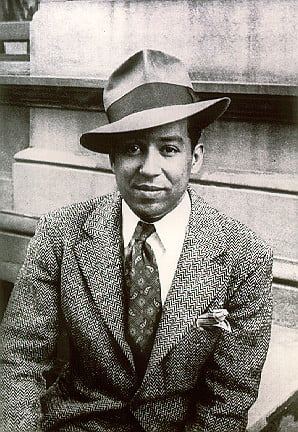
Who’s Passing for Who? Langston Hughes
На этой странице вы найдете полный текст песни "Who’s Passing for Who?" от Langston Hughes. Lyrxo предлагает вам самый полный и точный текст этой композиции без лишних отвлекающих факторов. Узнайте все куплеты и припев, чтобы лучше понять любимую песню и насладиться ею в полной мере. Идеально для фанатов и всех, кто ценит качественную музыку.

One of the great difficulties about being a member of a minority race is that so many kindhearted, well-meaning bores gather around to help. Usually, to tell the truth, they have nothing to help with, except their company--which is often appallingly dull.
Some members of the Negro race seem very well able to put up with it, though, in these uplifting years. Such was Caleb Johnson, colored social worker, who was always dragging around with him some nondescript white person or two, inviting them to dinner, showing them Harlem, ending up at the Savoy--much to the displeasure of whatever friends of his might be out that evening for fun, not sociology.
Friends are friends and, unfortunately, overearnest uplifters are uplifters--no matter what color they may be. If it were the white race that was ground down instead of Negroes, Caleb Johnson would be one of the first to offer Nordics the sympathy of his utterly inane society, under the impression that somehow he would be doing them a great deal of good.
You see, Caleb, and his white friends, too, were all bores. Or so we, who lived in Harlem's literary bohemia during the "Negro Renaissance" thought. We literary ones considered ourselves too broad-minded to be bothered with questions of color. We liked people of any race who smoked incessantly, drank liberally, wore complexion and morality as loose garments, and made fun of anyone who didn't do likewise. We snubbed and high-hatted any Negro or white luckless enough not to understand Gertrude Stein, Ulysses, Man Ray, the theremin, Jean Toomer, or George Anthell. By the end of the 1920's Caleb was just catching up to Dos Passos. He thought H.G. Wells good.
We met Caleb one nigh tin Small's. He had three assorted white folks in tow. We would have passed him by with but a nod had he not hailed us enthusiastically, risen, and introduced us with great acclaim to his friends who turned out to be schoolteachers from Iowa, a woman and two men. They appeared amazed and delighted to meet all at once two Negro writers and a black painter in the flesh. They invited us to have a drink with them. Money being scarce with us, we deigned to sit down at their table.
The white lady said, "I've never met a Negro writer before."
The two men added, "Neither have we."
"Why, we know any number of white writers," we three dark bohemians declared with bored nonchalance.
"But Negro writers are much more rare," said the lady.
"There are plenty in Harlem," we said.
"But not in Iowa," said one of the men, shaking his mop of red hair.
"There are no good white writers in Iowa either, are there?" we asked superciliously.
"Oh, yes, Ruth Suckow came from there."
Some members of the Negro race seem very well able to put up with it, though, in these uplifting years. Such was Caleb Johnson, colored social worker, who was always dragging around with him some nondescript white person or two, inviting them to dinner, showing them Harlem, ending up at the Savoy--much to the displeasure of whatever friends of his might be out that evening for fun, not sociology.
Friends are friends and, unfortunately, overearnest uplifters are uplifters--no matter what color they may be. If it were the white race that was ground down instead of Negroes, Caleb Johnson would be one of the first to offer Nordics the sympathy of his utterly inane society, under the impression that somehow he would be doing them a great deal of good.
You see, Caleb, and his white friends, too, were all bores. Or so we, who lived in Harlem's literary bohemia during the "Negro Renaissance" thought. We literary ones considered ourselves too broad-minded to be bothered with questions of color. We liked people of any race who smoked incessantly, drank liberally, wore complexion and morality as loose garments, and made fun of anyone who didn't do likewise. We snubbed and high-hatted any Negro or white luckless enough not to understand Gertrude Stein, Ulysses, Man Ray, the theremin, Jean Toomer, or George Anthell. By the end of the 1920's Caleb was just catching up to Dos Passos. He thought H.G. Wells good.
We met Caleb one nigh tin Small's. He had three assorted white folks in tow. We would have passed him by with but a nod had he not hailed us enthusiastically, risen, and introduced us with great acclaim to his friends who turned out to be schoolteachers from Iowa, a woman and two men. They appeared amazed and delighted to meet all at once two Negro writers and a black painter in the flesh. They invited us to have a drink with them. Money being scarce with us, we deigned to sit down at their table.
The white lady said, "I've never met a Negro writer before."
The two men added, "Neither have we."
"Why, we know any number of white writers," we three dark bohemians declared with bored nonchalance.
"But Negro writers are much more rare," said the lady.
"There are plenty in Harlem," we said.
"But not in Iowa," said one of the men, shaking his mop of red hair.
"There are no good white writers in Iowa either, are there?" we asked superciliously.
"Oh, yes, Ruth Suckow came from there."
Комментарии (0)
Минимальная длина комментария — 50 символов.












